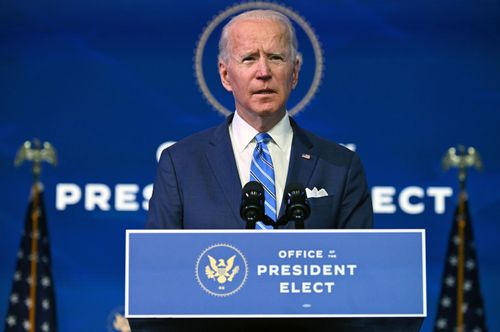Biden to sign executive orders rejoining Paris climate accord and rescinding Muslim ban on first day

President-elect Joe Biden plans to sign roughly a dozen executive orders, including rejoining the Paris climate accord and ending the travel ban on predominantly Muslim countries, on his first day in office, according to a memo from incoming chief of staff Ron Klain.
He’ll also sign orders halting evictions and student loan payments during the coronavirus pandemic and issuing a mask mandate on all federal property in an effort to either roll back moves made by the Trump administration or advance policy in a way that was impossible in the current administration.
One of Biden’s most common campaign trail promises was to tackle an issue on his first day in office — a pledge he usually made to either contrast himself with President Donald Trump or highlight just how important he believed an issue to be. These promises were made on everything from climate change to immigration to foreign policy, and many are reflected in Klain’s Saturday memo, which was first reported by the New York Times.
“During the campaign, President-elect Biden pledged to take immediate action to start addressing these crises and build back better,” Klain writes. “As president, he will keep those promises and sign dozens of executive orders, presidential memoranda, and directives to Cabinet agencies in fulfillment of the promises he made.”
Beyond executive actions in his first days in office, the memo outlines that Biden plans to send Congress a large-scale immigration plan within his first 100 days in office. The plan would offer a pathway to citizenship for the millions of undocumented immigrations currently in the United States.
Biden rolled out his first legislative priority this week, announcing a $1.9 trillion coronavirus relief package that included direct payments to Americans. Biden made clear during a speech on the plan that he wanted it to be the first issue Congress takes up after he is inaugurated on January 20.
The day after Biden is inaugurated, according to Klain, he will “sign a number of executive actions to move aggressively to change the course of the COVID-19 crisis and safely re-open schools and businesses, including by taking action to mitigate spread through expanding testing, protecting workers, and establishing clear public health standards.”
And on January 22, Biden will direct his Cabinet agencies to “take immediate action to deliver economic relief to working families bearing the brunt of this crisis,” Klain writes.
The flurry of action is meant to show Americans that Biden is not wasting any time taking control of the coronavirus — something the Biden transition has been intently focused on. But the scope and breadth of the topics Biden will address also highlights the extent to which Democrats believe the incoming administration will have to be focused on multiple issues at once to be successful.
From January 25 to February 1, Klain writes that Biden will issue orders on everything from directing his government to buy American products to beginning to fulfill promises to reform the criminal justice system.
During that week-long period, Biden will also order the federal government to determine how to reunite children separated from their families at the US-Mexico border, as well sign additional orders aimed at tackling climate change and expanding access to health care.
“Of course, these actions are just the start of our work,” Klain writes. “Much more will need to be done to fight COVID-19, build our economy back better, combat systemic racism and inequality, and address the existential threat of the climate crisis. But by February 1st, America will be moving in the right direction on all four of these challenges — and more — thanks to President-elect Joe Biden’s leadership.”
This story has been updated with additional information.